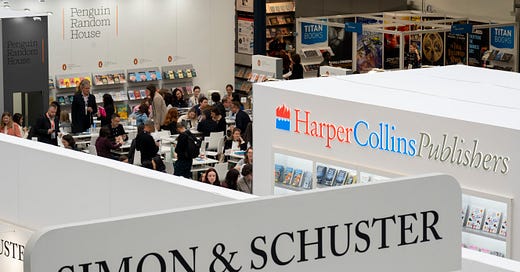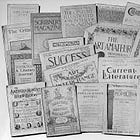The Big Five Publishers Have Killed Literary Fiction
Serious readers must expand their tastes to the small presses.
Literary fiction is dead. Or, so we’ve been told. Perhaps we can agree it lies bleeding.
It’s convenient to assume that readers are to blame for killing literary fiction, and publishers have abandoned it because book-buyers are stupid, have bad taste, and just aren’t reading anymore. But what has actually occurred is death by committee.
One hundred years ago, there were dozens of publishing houses and a robust publishing landscape. This is the idea of publishing that so many of us still have stored away in our collective memory—a competitive marketplace in which publishers needed to nurture, court, outbid, and out-promise each other in landing both emerging and established writers. This process gave us—among so many others—Flannery O’Connor, Tom Wolfe, Vladimir Nabokov, and James Baldwin.
No longer. Mirroring many other American industries, publishing has followed the path of consolidation, starting when Random House bought Knopf in 1960. What followed was a fifty-year feeding frenzy of mergers and acquisitions. In 2012, when Random House and Penguin merged, we were left with today’s “Big Five”: Penguin Random House, Hachette, Macmillan, HarperCollins, and Simon & Schuster. The result is a monopsony, a market dominated by only a few buyers. In the absence of genuine competition, monopsonists, like monopolists, have a tendency to reject the laborious pursuit of quality in favor of short-term profit.
We are now at the logical end-point of that process, with the government compelled to step in and block additional mergers in order to keep even a shred of literary competitiveness alive. In 2022, a federal antitrust suit blocked Penguin Random House’s merger with Simon & Schuster. For writers, it was something like a last-minute stay of execution, but the trial laid bare the problems that high-quality fiction faces in a homogenized publishing landscape. Testifying for the government during the trial, Stephen King explained: “Let’s say if you are an agent and your specialty is baseball teams, you have something like 32 teams that you could negotiate with. But when it comes to big publishers, there are five. You know, baseball players have a saying, you can’t hit them if you can’t see them. And you can’t sell books competitively if there are only so many people in the competition.”
Publishing houses used to have blood feuds, much to the benefit of literature writ large. But monopolies are always sedate, always predictable. Over the last decades the Big Five have decided that the safe money is on “auto-buy” readerships and genre hits: “romantasy” series, celebrity memoirs, and established earners like Kristin Hannah and Nicholas Sparks. This makes sense, if you think like a machine beholden to algorithms and shareholders. Instead of an eye-blackening scrum over who gets to publish the next Tom Wolfe, nobody’s quite sure that his fresh, satirical voice is worth chancing in the first place. As a consequence of this mode of thinking, literary fiction has fallen to only two percent of the fiction market. From the publishers’ perspective literary fiction is just too risky—and that risk has nothing to do with questions of form or taste. It’s much more simple and less political than that.
A risky bet is any manuscript that does not look like what sold best yesterday. This is why agents tell aspiring authors to compare their manuscripts to big-hit successes from the last three years. Authors, especially debut authors, must prove that their novel has an “automated” quality and will slide, as easily as possible, from the conveyor belt into a shopping cart.
Though it might help maximize their profits for the short term, the Big Five’s choice to sacrifice their flagship product, literary fiction, undermines their entire reason for being. That trend of thinking-by-committee—maximizing short-term profits at the expense of the long-term health and raison d’être of the industry—is nothing new. But, now, the Big Five’s choice to underinvest in literary novels reaches its logical end in the coming emergence of the “AI novel,” which, frankly, may mark the end of literature as we’ve known it.
As we speak, bots are actively in the process of mining literary fiction’s most sensitive, most complex stories for—one can’t help but assume—the eventual purpose of churning out cheap, brainless, computer-generated “novels.” In November, HarperCollins struck an “opt-in” AI deal, in which authors are compensated $2,500 for giving their book over to an AI training model. In order to slowly boil off resistance to substituting human art with silicon trash, publishers often float “soft” AI options, such as replacing audiobook narration with computer-generated voices. Reader, beware the sentimental allusion to impoverished children listening to books in their native dialect. The Big Five has never cared about them before, and it doesn’t care about them now.
The only reason that OpenAI and its competitors believe they can outsource a writer’s imagination and an editor’s judgment is because the Big Five did it first. Silicon Valley is simply extending the conglomerate publishers’ logic to its ugliest conclusion—the replacement of writer, editor, and reader with a machine. As a result, literary fiction appears to be down for the count.
However, there is hope.
The Big Five are not the only ones capable of publishing books. Small presses, with their miniscule budgets, have kept literary fiction on life support. They take the creative risks that the Big Five won’t, and they nurture and sustain writers’ careers in a way the Big Five no longer cares to. If you enjoyed James by Percival Everett (published to great fanfare this year by Big Five imprint Doubleday), thank the small press Graywolf who doggedly published Everett for decades before the Big Five finally decided to cash in on him.
The reader’s challenge now is to look beyond the Big Five’s mediocrity machine. This is not easy, considering how many imprints the Big Five holds, but it is possible. Readers are not just static consumers. If we choose which writers we want to read, we can also choose which publishers we want to buy from—and can recognize that, at this moment in time, the Big Five and the small presses are driven by entirely different incentives.
Literature, and literary fiction, is art, and art is unkillable. But literary culture can much more easily be destroyed. Today, the Big Five have the deepest pockets but lack the agility, chutzpah, and possibly even desire to act as guardians of high literature. Small presses such as Akashic, Two Dollar Radio, Short Flight/Long Drive and many others are filling that gap, notwithstanding their more limited budgets. In the end, it falls to readers to recognize what is happening and to seek out books from publishers that are genuinely interested in transcendent, creative work.
Elizabeth Kaye Cook is a writer in New York City. Her fiction and nonfiction have been published in Carve, The Gettysburg Review, Three Crows Magazine, etc. Her website is elizabethkayecookwriter.com and her newsletter is Notes from Elizabeth Kaye Cook.
Melanie Jennings is a MacDowell fellow whose short stories, essays, and poems have appeared in Fiction Southeast, Hotel Amerika, and the Crab Orchard Review. She lives in Oregon where she is working on a novel. Her website is mjennings.com. Here is her Substack.
Follow Persuasion on X, LinkedIn, and youtube to keep up with our latest articles, podcasts, and events, as well as updates from excellent writers across our network.
And, to receive pieces like this in your inbox and support our work, subscribe below:








I am a literary fiction writer myself and yes, everything you say here is true. But the story about who killed literary fiction in America is much uglier. It's not only the executives from the Big Five who never read fiction themselves. It's also all the boards, jury members, cultural gatekeepers of most publishing houses, including medium and small, which in the past used to publish the quality literary fiction the big ones refused too. The ugly truth is that, after 2015, all the above started to publish and/or reward the kind of ideological kitsch I've only seen represented by "socialist realist" literature in former communist countries. Have you looked at who got major prizes between 2016 and 2022? Not a single straight white man in the entire Anglosphere. Do you realize what that means? It means that all the people in key positions in the book industry were guided entirely by ideology. Not only literary greatness wasn't a question, but one couldn't even get close to a big publisher without the "correct" identity, never mind ideology. Stupidity, cowardice, luxury beliefs, moral righteousness, all of these killed literary fiction in America.
I would add a quick plug for the small presses specializing in literature in translation, which also do great work in a tough market--operations like Archipelago Books (one of my favorites), Deep Vellum, or Open Letter Books.